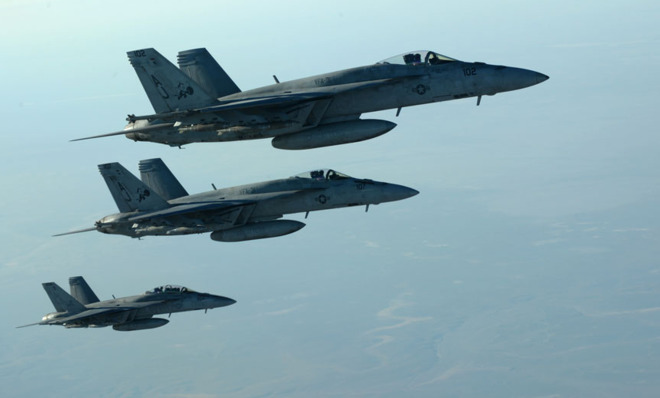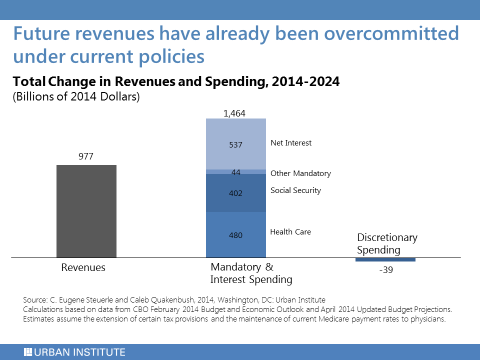Why America won't have enough money to battle ISIS
Future government revenues might already be "overcommitted"

A free daily email with the biggest news stories of the day – and the best features from TheWeek.com
You are now subscribed
Your newsletter sign-up was successful

President Obama says that it may take the U.S. and its allies three years to defeat Islamic State of Iraq and Syria militants, with heavy dependence on stepped up U.S. airstrikes. And some defense experts say it could cost the government an additional $15 billion to $20 billion a year to pursue this hazardous mission.
The fight against ISIS is already expensive. As of late August, the United States had spent $560 million fighting the group, and continues to spend $7.5 million daily on operations in Iraq. Last week Congress authorized the administration to spend an estimated $500 million to equip and train so-called moderate Syrian rebels to help counter the fast growing threat of ISIS.
But what if the mission mushrooms into a much bigger, more intensive and considerably longer operation than Obama has outlined — one that eventually forces the U.S. to send in combat troops into Iraq again? Will there be enough money in the defense budget to achieve Obama's goal of "degrading and destroying" ISIS while preserving a strong armed forces?
The Week
Escape your echo chamber. Get the facts behind the news, plus analysis from multiple perspectives.

Sign up for The Week's Free Newsletters
From our morning news briefing to a weekly Good News Newsletter, get the best of The Week delivered directly to your inbox.
From our morning news briefing to a weekly Good News Newsletter, get the best of The Week delivered directly to your inbox.
Probably not, short of a major downsizing of the military and its gold-plated retirement and health care programs or a massive increase in deficit spending, according to economist Eugene Steuerle, a budget expert with the Urban Institute.
Steuerle, author of Dead Men Ruling: How to Restore Fiscal Freedom and Rescue Our Future, argues that years of accumulated tax cuts, discretionary budget policy, and entitlement programs have set so much of federal spending in concrete that lawmakers and the administration have little flexibility to respond to major crises or problems such as natural disasters or the upheaval in the Middle East.
Defense Secretary Chuck Hagel and many congressional hawks already are complaining that the Pentagon is being hemmed in by budgetary constraints that may ultimately limit what the U.S. can do in the Middle East. Locked in spending for Social Security, Medicare, Medicaid, and interest on the national debt will far outstrip projected revenues in the coming decade, putting enormous pressure on discretionary spending — including the hundreds of billions of dollars that annually go for defense.
"What happens if the war against ISIS is going to be protracted?" Steuerle said in an interview on Monday. "What happens if this is an indication — if nothing else — that we're not going to get out of the Middle East for the foreseeable future?"
A free daily email with the biggest news stories of the day – and the best features from TheWeek.com
"Look, maybe this emergency won't be that expensive or maybe this problem won't be that expensive, but where's the flexibility in the budget to start doing these things?" he added.
A simple bar chart that appears in Steuerle's book clearly illustrates the problem — that future government revenues in the coming decade have already been "overcommitted" under current legislative policy.

Indeed, between 2014 and 2024, the government will see net interest on the debt, Social Security, health care, and other mandatory programs skyrocket by $1.46 trillion while revenues rise by only $977 billion — producing a net loss of $39 billion of discretionary funds for general government agencies and programs including the Pentagon.
For months leading up to Obama's recent announcement of his plans to combat ISIS, Hagel lobbied members of Congress to terminate the roughly $500 billion of long term defense cuts — part of what was known as the sequester — that were mandated under the Budget Control Act of 2011. The Pentagon absorbed about $37 billion of those cuts last year, before Congress and the administration negotiated a two-year budget deal for fiscal 2014 and 2015 that would temporarily block the sequester.
There will also be a new round of much tougher automatic spending cuts beginning late next year unless Congress steps in and cancels them altogether.
Steuerle said that the public hasn't yet grasped the fact that Pentagon belt-tightening will mean a substantial reduction in military personnel and attendant retirement and health care spending at the same time it will be expanding its mission in the Middle East. An analysis released by the Defense Department on April 15 concluded that sequester level budgets would result in continued cuts in force levels across the military services — including a reduction to 420,000 active duty soldiers in the Army and a drop to 175,000 active duty Marine Corps personnel.
The additional $15 billion to $20 billion a year it will take to battle ISIS — was projected by American University military expert Gordon Adams. That spending would come on top of the administration's defense budget request for fiscal 2015, which begins Oct. 1, including $496 billion for personnel and general DOD operating costs as well as $58 billion for "Overseas Contingency Operations," which covers the actual cost of wars.
More from The Fiscal Times...
-
 How the FCC’s ‘equal time’ rule works
How the FCC’s ‘equal time’ rule worksIn the Spotlight The law is at the heart of the Colbert-CBS conflict
-
 What is the endgame in the DHS shutdown?
What is the endgame in the DHS shutdown?Today’s Big Question Democrats want to rein in ICE’s immigration crackdown
-
 ‘Poor time management isn’t just an inconvenience’
‘Poor time management isn’t just an inconvenience’Instant Opinion Opinion, comment and editorials of the day